This week on Reading The Wheel of Time, we’re covering the middle of the prologue of Winter’s Heart, in which Elayne and Aviendha go through the Aiel first-sisters ceremony. It’s a really interesting section, and I mostly really liked it, despite a few quibbles here and there.
Leaving Dyelin, Birgitte, the Sea Folk, and the Asha’man behind, Elayne follows Nandera down the hall, wrapped only in the cloak. She has realized the timing of all this was intentional, to make sure that adopting Aviendha was important enough to Elayne. Nandera remarks that Elayne is sharp to see it, and that she almost put a stop to the men turning their backs except that Taim kept sneaking glances and it was clear that Elayne felt them. Elayne is furious at the revelation, but Nandera doesn’t see the big deal and suggests that Elayne focus on the woman she wants for a sister instead of thinking about men.
Elayne is taken to a room where Aviendha, also naked, is waiting with over a dozen Wise Ones. Elayne is surprised to see that Amys has Traveled from Cairhien, and expresses a wish that Melaine were in attendance as well. But she is told that the weaves used in the ceremony could touch Melaine’s unborn children, making them part of Aviendha and Elayne’s bond, or possibly even killing them. Elayne hadn’t realized that the One Power would be part of the ceremony, but is assured that nothing that happens will affect anyone outside of the room—at most, Birgitte will be dimly aware of some of Elayne’s experiences.
Elayne and Aviendha sit in the circle of Wise Ones. Two of them, Viendre and Tamela, symbolically stand in for their mothers, while Amys offers herself to “suffer the pangs of birth” for them. Next, Aviendha and Elayne are asked intimate questions about how they view each other; what the other’s best and worst qualities are; what is the most childish thing about the other; and what about the other woman makes them the most jealous. As they answer, weaves of saidar capture their voices, releasing the answers at the same time after both have finished speaking.
Buy the Book
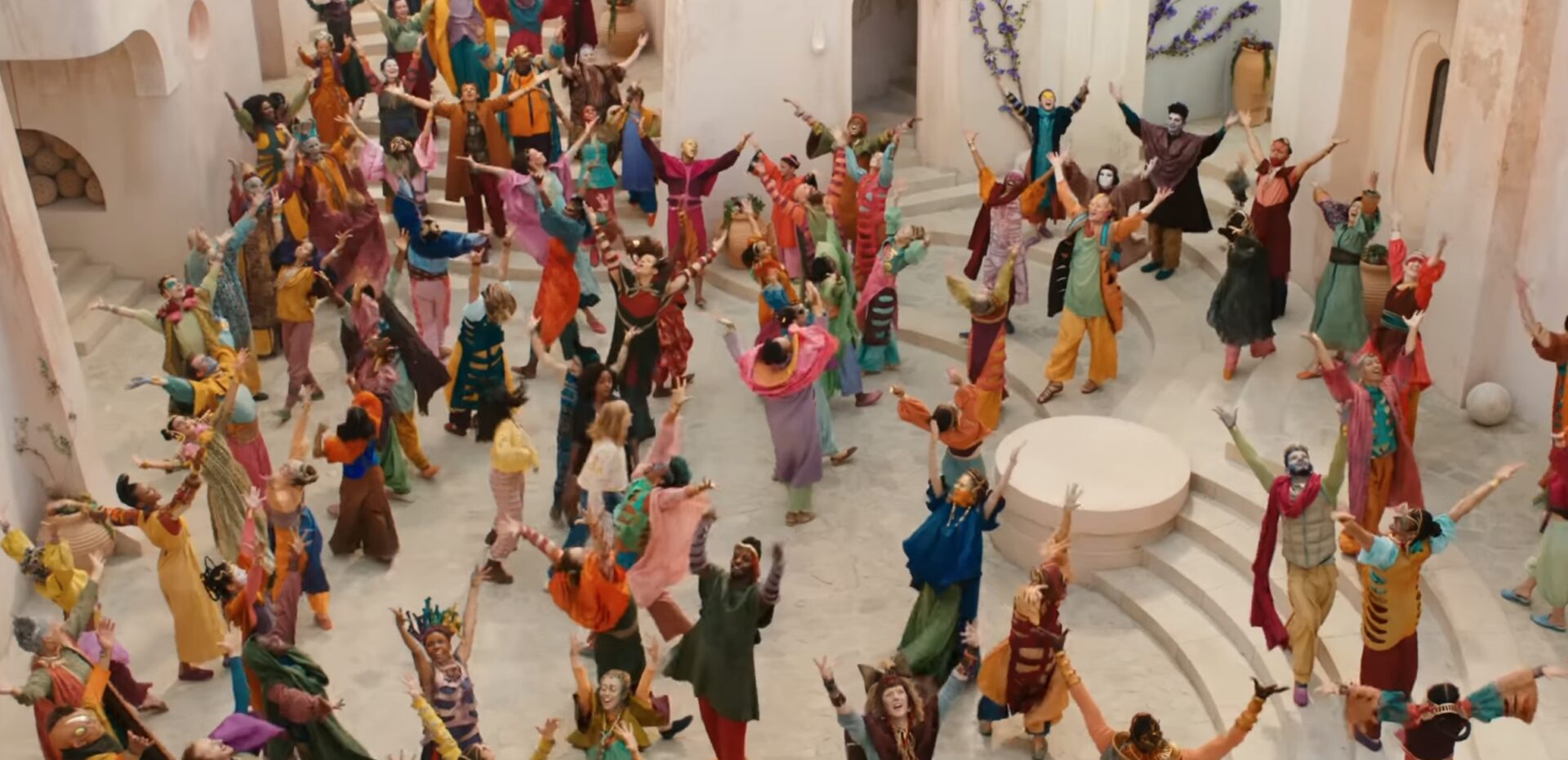

All the Hidden Paths
When Elayne hears good things about herself from Aviendha, Viendre cuts Elayne down, countering the positive narrative. When Elayne’s answers criticize Aviendha. Viendre points out the ways in which Elayne is no better, just as guilty of the same flaws. Tamela does the same for Aviendha. When that exercise is over, the two prospective sisters are told to slap each other as hard as they can, first with one hand, and then the other, knocking each other down.
Monaelle, who is leading the ceremony, tells them that they may leave now, if they wish, but if they still love each other enough to go on then they should embrace, which they both do, both apologizing profusely.
Monaelle was standing over them, now. “You will know anger at one another again, you will speak harsh words, but you will always remember that you have already struck her. And for no better reason than you were told to. Let those blows pass for all you might wish to give. You have toh toward one another, toh you cannot repay and will not try to, for every woman is always in her first-sister’s debt. You will be born again.”
Elayne can feel the weaves of saidar changing, and the room grows darker. Everything fades, including her sense of herself as Elayne.
She experiences being in the womb, aware of another in there with her, and experiences birth. When she eventually comes back to herself and recalls who she is, she finds herself and Aviendha both being cradled by Amys.
“This is my daughter Aviendha,” Amys said, “and this is my daughter Elayne, born on the same day, within the same hour. May they always guard one another, support one another, love one another.” She laughed softly, tiredly, fondly. “And now will someone bring us garments before my new daughters and I all freeze to death?”
Elayne did not care at that moment if she did freeze to death. She clung to Aviendha in laughter and tears. She had found her sister. Light, she had found her sister!”
Does anyone else remember when that study from BYU came out in 2010 that said having a sister makes you a happier and better person? As someone with two sisters of my own, and who once considered myself a sister in turn, I was more than a little tickled by the study’s claims. And as I was reading this section of the prologue, I kept thinking about the conversations I saw online for weeks after, as people told their own stories about growing up with sisters and siblings.
You all know how I feel about defining people by applying binary gender rules. Jordan does it a lot, and often in silly or egregious ways, but it’s not always wrong. In the modern US, for example, the cultural expectations of women (that they should be kind and caring, that they are gentle, that they should be protected, that they are good mediators) can result in women having a certain kind of close and intimate bond with each other that men are often not able to achieve, because men are not encouraged or allowed that when they are young and developing. We’ve increasingly seen in online conversation that many adult men feel isolated as a result, and that people in heterosexual relationships often experience communication issues because of the way men and women can feel like they come from different cultures. (Men are from Mars, etc. etc.)
The problem, of course, comes when society asserts that these differences are innate and immutable, rather than the results of rules that culture created and that are enforced on children more or less from the moment of their birth. Jordan also makes this mistake, building gendered stereotypes into the very fabric of creation with saidin and saidar and failing to create more than minor differences in how different cultures identify and define gendered norms. That being said, however, throughout the series you can see Jordan’s curiosity around—and perhaps even jealousy of—the communication and connection that women have with each other. Although Perrin, Rand, and Mat are good friends, I think it’s very relevant that none of them have found anyone with whom they share the kind of deep friendship that Elayne and Aviendha have with each other, or even that the two of them have with Nynaeve and Elayne has with Min.
(Perrin has probably gotten the closest with Gaul and Elyas. Mat is good with people, but his are casual relationships with fellow soldiers and gamblers. Rand is, of course, aloof with everyone—the closest he gets is with Bashere and Lan, men who don’t exhibit fear of him, and who take on slightly mentor-y roles towards him. I would guess that both Lan and Bashere probably remind Rand of Tam a little, which helps him be less suspicious of them.)
So while I dislike the assertion that women are better able to connect with each other because of some innate biological reality, I do think that Jordan’s exploration of these connections is interesting, and can be very insightful. The Wheel of Time is very much about how secrecy, shame, and fear continually interfere with the forces of good (both for men and women) when it comes to working together and communicating effectively. Sometimes this is the result of interference by Dark Forces, while other times the main problem might be one or more individuals’ own personal flaws—but either way, the results are very significant, and can often be frustrating for the reader, who has a much clearer picture of what’s happening than any single character in the story.
This week, however, we have the exact opposite of that situation. Aviendha and Elayne were initially unsure how they would build a relationship together, and were dealing with the complications of already knowing, before they even met, that they were destined to share the same man. They were both very understandably nervous and guarded about it, but they still went into their prospective friendship with openness and a desire to trust. Now, not only have they become very close and very secure with each other, they have actively chosen to undergo a ritual that tests that security and demands even more honesty and vulnerability than that which they already share. And although the first-sister relationship is required under Aiel law for them to eventually be sister-wives, it is made very clear that this is a relationship they both want, independently of any connection to or for Rand.
Like Elayne, I assumed that the first-sisters ceremony was just a regular type of commitment ceremony, and I was surprised by the fact that there was so much saidar, and a whole simulated (re)birth, involved. But my favorite part of the process is the requirement of being so honest with each other, that each had to say out loud not only what she loves and respects her soon-to-be sister, but also what she sees as the other’s flaws, what about the other each might be jealous or resentful of. Even the requirement to physically strike each other is designed to increase trust and intimacy between the two. As Monaelle points out, they will have fights and disagreements in the future. But each woman has now affirmed, for the other and most importantly for herself, that she loves her sister more than she might resent a slight or be angered by a confrontation. She has now forgiven insults and blows, and asked forgiveness in turn, and when they argue in the future, they will be able to look back on this argument, simulated just as the birth is simulated, and yet made real through being experienced, just as the shared experience of being in the womb is made real.
And if you think about it, what the Wise Ones have given Aviendha and Elayne’s friendship is quite a gift. Even the closest and most loving relationship will experience conflict many times over the span of its existence. People hurt each other, both intentionally and unintentionally, because human beings are messy and imperfect. The truest relationships survive these conflicts because the people in them choose to work on them, to forgive each other, to recommit to the relationship. Love, platonic, romantic, sisterly, is a choice we make, and one we must constantly affirm.
Usually, very deep relationships are either forged over a good deal of time or because the people involved go through an intense experience together. And often “intense” means “traumatic.” It’s really incredible that the Aiel have a way to create a sort of crucible for these first-sibling relationships that is intense but also joyful and ultimately very positive. (I might ask why there isn’t actually a first-sibling option for people of different genders who want to become siblings this way, but I mean… I know why.) It feels very, very special, particularly in this series, and it got me thinking about how some of the Forsaken have been baffled by the existence of weaves that were not known in their day, like the Warder bond. I wonder how what the Wise Ones do in the first-sisters ceremony evolved, and whether the extreme loss that they experienced during the breaking might have something to do with the development of a type of channeling that allows one to have a new sibling, and also a new mother, as it turns out.
I had such a pang in my heart for Elayne when Monaelle asked if their mothers were present. It’s easy to forget that Elayne (and everyone else) still thinks that Morgase is dead. I feel like Jordan is going to keep that secret going for a very long time, and I am definitely side-eying him about it.
I’m also looking a little askance at the term sister-wives. Jordan didn’t come up with it of course—it’s used in Mormon polyamory to describe women married to the same man, and possibly elsewhere. But the term has never sat right with me, in part because it makes the whole thing sound a little incest-y, and in part because it seems like the term is designed to make if very and aggressively clear that there there is nothing remotely sexual or romantic about the relationship between the women. Of course, there’s nothing wrong with an arrangement like that, but the insistence on polyamory as only being patriarchal and heteronormative is. You can almost feel the “no-homo” in the term “sister-wives,” both in our culture and in the Aiel’s.
And then there is the fact that the first-sister ceremony has the participants experiencing being together in the womb as twins and being born to the same mother, which does increase the incesty-feeling a bit for me. Maybe that’s a smidge nit-picky, but I feel like it would have been easy enough to choose a different term other than sister-wives for women.
I do, however, really understand now why Aiel culture requires women to become first-sisters before they can be married to the same man. What the Wise Ones are essentially doing is requiring such women to learn how to work together, face conflict, and manage their relationship effectively. Communication, trust, and teamwork is necessary in any relationship, of course, and the more people are involved in the dynamic, the more those things become essential for everyone to function within the group. In any polyamourous configuration.
Like Elayne, I wonder what kind of uncomfortable situation Aviendha was put into when she was called to the ceremony. Perhaps she was interrupted fulfilling some other duty of hers, something she would feel shame leaving undone, or would incur toh for. I didn’t much care for Nandera’s choice to interrupt Elayne while there were Asha’man there. I guess the point is that the Aiel don’t have the same kind of predation of men against women that the wetland cultures do, but it always twinges me the wrong way whenever a Wise One or Maiden is like “of course men like to look at naked women, why are you being weird?” If Nandera had any idea who Taim was, or suspected that he was a Darkfriend, she might have viewed things differently. Then again, maybe that would have been an even better test? But from a narrative standpoint it did make me a little uncomfortable.
I mean, it kind of makes sense that they have to get naked to be born, but also it kind of doesn’t? And once again we’re looking at a female channelers having to get naked for some sort of logical but also kind of silly reason. At least Nandera didn’t make Elayne walk the whole way without the blanket. Although if she had, it would have been an echo of the old Aes Sedai tradition of walking from your raising to your Ajah quarters “clad only in the Light,” which amused me a little. But I don’t think walking around naked for secret Aiel ceremonies would be a great impression for Elayne to leave on people. At least until she’s actually been crowned.
My final thought was about Melaine. I know Melaine has a strong connection with Min since Min had a viewing of Melaine’s future children. But I don’t remember when Elayne got to know her. Maybe that happened off screen, so to speak, but it did feel symbolically relevant that Elayne has that connection to Melaine, since Min is going to be the third partner to Rand. Also the fact that Melaine is going to have twins parallels the fact that the first-sister bond is also a twin bond.
Twins are always important and symbolic in fantasy and science fiction, as they often are in mythology and folklore as well. I like the idea of giving two people who are so dedicated to each other a bit of that fabled “twin-connection.”
Next week we’ll finish up the prologue, catching up with Toveine and then with Rand and Min. Rand has some momentous plans, and I can’t wait to see how they unfold.
Happy Turkey Day to those who are taking part in that, and I hope you all have a wonderful week.
Sylas K Barrett would like to shout out his own two sisters, for whom he is continually grateful, now and in childhood. I don’t know who I would be without them.










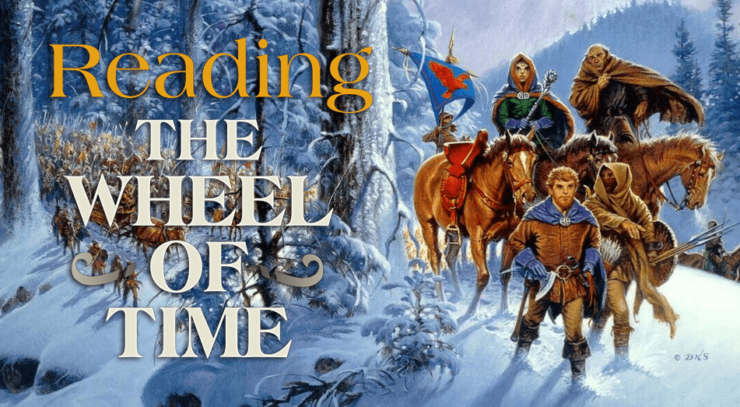
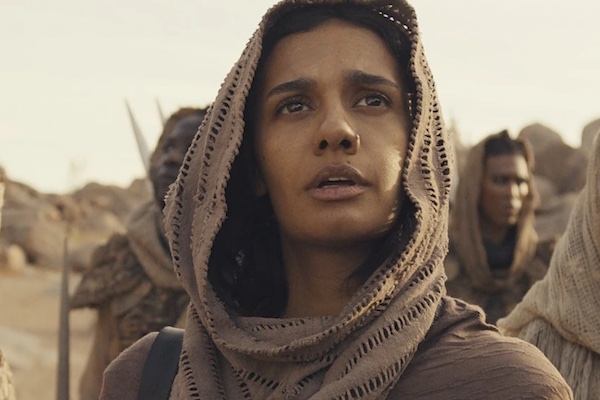
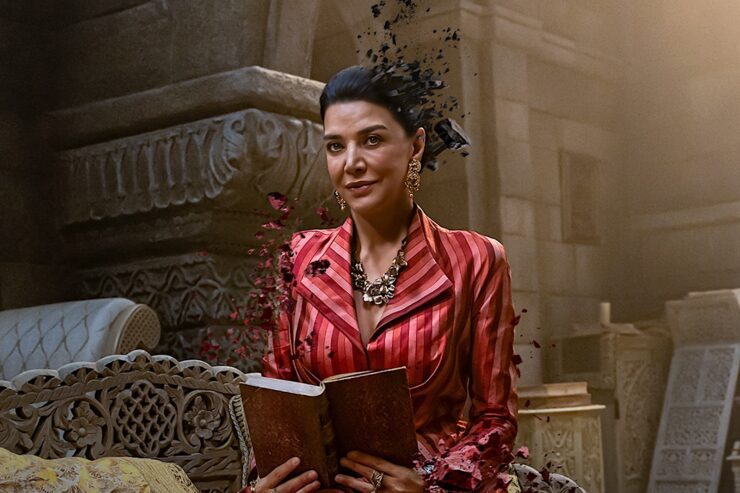

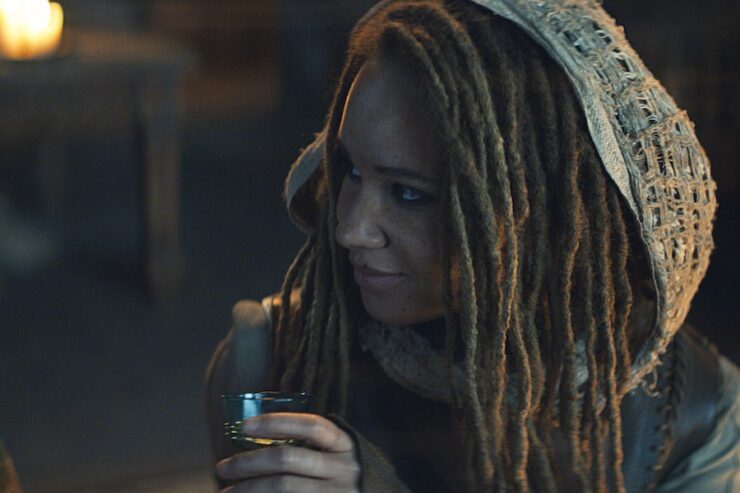
As a twin who was separated at birth and didn’t learn about my twin until we were in our thirties, I have to admit this account hits me squarely in my feels. It makes me wonder, what could have been?
It might be instructive for Sylas to understand that adopting one another as first-sisters is not something that is being done in relation to their relationship with Rand at all. As far as Aiel kinship is concerned I’m pretty certain that they need not be first sisters in order to become sister wives. That may make some difference in the context of the thoughts Sylas has here.
Additionally, Aiel men can and do (though rarely) go through the ceremony to become first brothers and Jordan did confirm that there were cross-gender adoptions as well, though these were even more rare. To be fair to Sylas I’m nearly certain that neither of these things were ever referenced within the text of the WoT proper but he certainly intended them. I am not certain though if either of those scenarios involve the One Power like we see in Avi and Elayne’s case or if it is just done when two women are involved in the ceremony. For some reason I suspect not.
Elayne and Melaine met several times in Tel’aran’rhiod, when Nynaeve and Elayne had their regular meetings with Egwene there.
KAne1684 @2:
I thought Sylas was right, but in going back to look up the references, I realized that although it’s subtle, you are definitely correct. Here are the two critical lines, both spoken by Aviendha to Elayne in LoC:
The key word in both quotes is “as”. They don’t actually need to officially be first-sisters, but they need to be close enough that they could be.
It’s cool that after 30 years of reading this series, I’m still picking up little details like this.
I do wonder how Sylas will react to the nature of Gabrelle’s relationship with Logain. #Don’tKinkShameGabrelle
“I guess the point is that the Aiel don’t have the same kind of predation of men against women that the wetland cultures do […]”
Some of them will…
It’s easy to forget that Elayne (and everyone else) still thinks that Morgase is dead. I feel like Jordan is going to keep that secret going for a very long time, and I am definitely side-eying him about it.
I see no reason for side-eying here. Only five people know that Maighdin is actually Morgase and they are all with her keeping it a secret. Whitecloaks are aware Morgase is alive but they will not tell, for obvious reasons.
#7 I think it’s because Jordan is sort of fridging Morgase so to speak. Yes it makes sense why no one knows that she is alive, but the circumstances surrounding her willingly remaining hidden are as a result of the Jordan’s thematic penchant for not having characters communicate, which in this case often felt a bit contrived to me.
#8
Do not forget that another reason for her to keep her identity hidden is that she is with Perrin who basically declared in independency for Two Rivers.
Yes, there has not been an Andoran tax collector there in ages, but for her (and for Elayne) Two Roivers is part of Andor.
Add the Manetheren banners on top of that…
Morgase’s storyline seems to be one of the ones Jordan lost control of. She’s the kind of character who’s usually written out of the story to clear the way for the younger generation of heroes. While I sympathize with Jordan’s desire to tell Morgase’s story, I feel that it added to the accumulating burden of story that needed to be resolved in order to finish the series. So she struggles to find a place in a narrative that is increasingly concerned with The End than with spinning out a broad tapestry of stories.
#9 I agree that that’s the rational that we are presented with. However again I think a tiny bit of communication between the lord and new members of his household would quickly solve that. Morgase is presented as being prideful and strong but also really intelligent. To imagine that being presented with the extreme degree to which Andor failed the Two Rivers, as well as the Perrin’s staunch support and fondness of Elyane, as well as his insider knowledge of the fact that Rand moved on Andor not for conquest but to avenge her against Rhavin. I think if that happened she would reveal herself, maybe even present herself as an intermediary to keep the Two Rivers somewhat under Andoran authority. Lino is used to forestall that from happening, and her busybodiness is one of the reasons I don’t really like her as a character. If memory serves Morgase only finds out about Rhavin by accident no?
@@@@@ 11 – but I’m not sure why we should assume that Morgase will get all this information. As you say, she only finds out that Rahvin was Gaebril towards the end of the story, and without that crucial bit of knowledge… what does she actually know?
Once she leaves Amador, she’s travelling with Perrin, a man about whom she knows precisely two things: one, that he’s raised the flag of rebellion in her nation, and two, that he’s good friends with the Dragon Reborn… who recently conquered Caemlyn. Even if she hates Gaebril, she can’t like another man conquering her land. And on top of all this, her brain has been scrambled by months of intense Compulsion, which must have some impact.
And there is no reason for her to know more than that! Even as she begins to learn more about Perrin, and respect him as a person and leader, she has many reasons to keep quiet and not many to speak up. Do we have any evidence that Perrin speaks fondly of Elayne in Morgase’s hearing? I don’t think so. He might reference Rand’s feelings for Elayne a couple times, but even if Morgase overhears it, why should she believe that? As far as Morgase is concerned, if her identity comes out while traveling with Perrin, she’ll either be imprisoned/killed because he’s a rebel, or propped up as a figurehead in a bid to oust Elayne. And all of her experience prior to this backs this up. She has no friends – her allies she sent away and/or tortured, and anyone else she thinks to ask for help is intent on using her for their own ends. Why should Perrin be any different, especially when there are so many obvious ways in which he could use her and her claim to the throne for his own benefit?
@11: Morgase’s reluctance to reveal her true identity is more legitimate than you make out. While Rand’s incursion into Caemlyn may have been justified, his rationale is a hard one for outside lookers to swallow. To such people, his claiming that Gaebril was one of the Forsaken and not just some smooth-talking provincial lordling sounds delusional at best and deceitful at worst. Add in that Morgase’s knowledge of these events comes from rumors filtered tenth-hand, and it’s not unreasonable for her to believe that Caemlyn is just another conquest.
Considering all this, why would she reveal herself to Perrin? She doesn’t know him from Jack and as far as she could reasonably tell is just another henchman. Add in how she’s effectively a refugee with no leverage and, worst case scenario, she would be kept hostage to ensure that Elayne behaved herself.
I love the first-sister ceremony, there is something really sacred feeling about it. And it’s cool to know (via the comments), as I had always wondered, if there is some type if analogous first-brother or first-sibling type of thing. I also wonder if they do have a Wise Woman present who can channel or not for those, since there’s no male option of course.
While I definitely agree the way we talk about men and women in terms of their emotional connections is really ridiculous (I have two boys and it bugs the heck out of me when people talk about how ‘boys are easy’ and ‘girls are hard/dramatic’ because it both really diminishes the interior lives of my boys, but also I find tends to frame a lot of stuff girls go through as just DRAMA, amirite?…when it fact it’s just about the human experience and need for both to learn how to process emotions, how to be vulnerable and how to foster true connection.)…I don’t know, I guess I do feel though that there still are some other types of generalized differences and that’s okay too. Our brains work a little different, our bodies are different….but it’s really valuable that we have those differences as long as we recognize it’s not a boilerplate or a mandate, or freak out when somebody doesn’t fit the mold. I suppose my relationship with my own femininity is a little different as I’ve always been a bit outside what was considered the norm for a girl in the 80s, and went through a period of rejecting girlhood (I had a lot of ‘not like other girls’ energy), but then later embracing it (and things I’d shunned because I was afraid of appearing ‘girly’, heaven forbid) even while recognizing (and refusing to apologize for) my differences.
I don’t even know where I was going with this, haha. I don’t know – I’m always kind of interested in these kinds of strong feminine societies/relationships in part because I had such a rough time of maintaining relationships with other girls growing up, so in some ways it’s kind of alien to me, but also something that has at times felt like a gap.